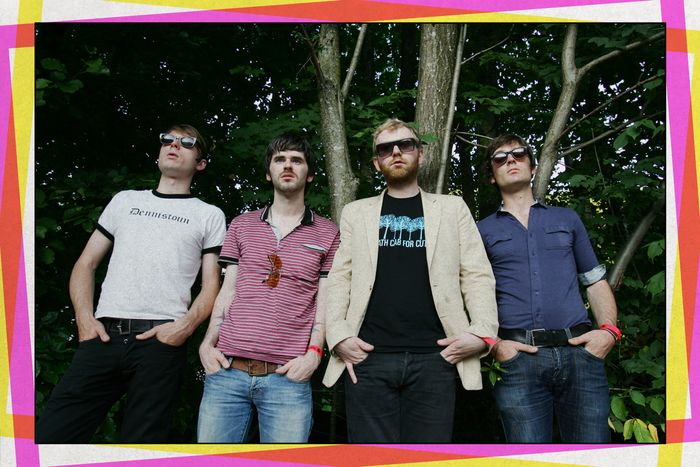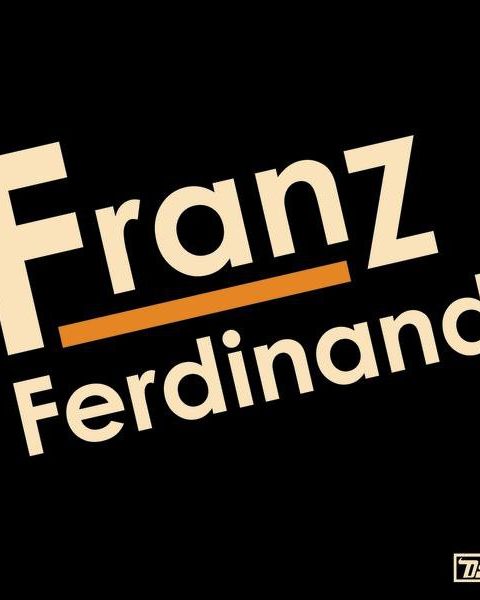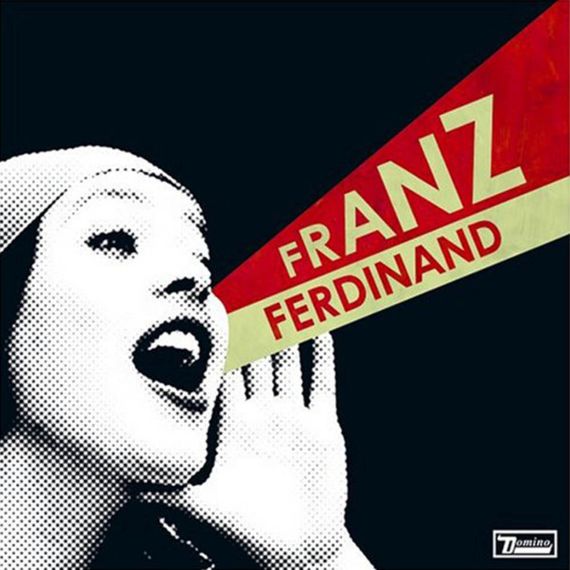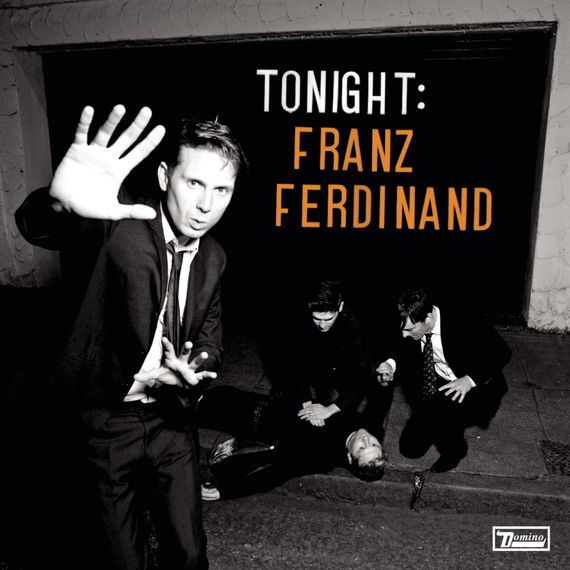
When I signed onto a Zoom call with Alex Kapranos a few weeks ago, I joked how his band put me in a dispiriting mood the day prior: I had long been in pursuit of a clean Franz Ferdinand vinyl to enhance my collection, only to go through the five stages of grief when a local shop tried to pass off a scratched record as mint condition. The nerve! I just want to finally listen to “The Dark of the Matinée” as our sonic overlords intended, you know? “Being a big record hunter, especially on tour in America, I always hunt out records,” he responded with a laugh. “And that is absolutely one of the most frustrating feelings in the world.”
Franz Ferdinand — indie lads, not archduke — is now two full decades into their history, enough so that Hits to the Head, a buoyant greatest-of album, will be released on March 11. Of course, you’re going to find their early triumphs “Take Me Out” and “Do You Want To” nestled in there, when the classic lineup of Kapranos, Bob Hardy, Paul Thomson, and Nick McCarthy were crafting some of the sexiest, suavest earworms in the genre at the time. (As well as making us perk up about Russian constructivism with their accompanying visuals.) But if you move beyond 2004’s Franz Ferdinand and 2005’s You Could Have It So Much Better, you’d know that the Glasgowians were a lot more innovative beyond a blanket “rock” classification: 2009’s Tonight shifted them to an electronics-leaning era, a louche surprise that followed them into 2013’s Right Thoughts, Right Words, Right Action and 2018’s Always Ascending. To love Franz Ferdinand is to love the dance floor, whether that floor has a disco ball above it or is covered in sticky film.
While the band’s lost two of its original members (and gained three newbies), Kapranos has remained Franz Ferdinand’s frontman, guitarist, and primary songwriter since forming in 2002. This year, they’re gearing up to tour extensively throughout Europe and are currently “making arrangements” to hit the road in America, too. In the meantime, Kapranos was enthused to reminisce about the band for our Superlatives column, from the highs and lows to potential name alternatives.
Best song
It’s always been the same answer at different points in my life, even before Franz Ferdinand: The newest song. The new one right now is “Curious.” That’s the last thing we recorded and it feels like it’s where my ideas are at the moment. I love the way it is. It feels like I’m singing in a way that I haven’t done yet, and it sounds distinctly Franz Ferdinand. It really makes me want to dance. I hope it makes other people want to dance as well.
The way that I sing the “Curious” chorus is really different, particularly the phrasing and the rapidity of the syllables. It’s something that I would’ve found intimidating when the band started off. I don’t think I would’ve had the guts to try and sing like that. That’s one of the good things of playing for so long — you do feel more adventurous as the years go by. It’s kind of like, “Oh, yeah. I’ve got the confidence to try some other things now.”
I would also choose a song that’s maybe not a “hit,” because personal favorites are not necessarily the songs that work as hits or that I enjoy playing live. I’m going to choose a song that I’ve never played live before, which is “Fade Together” from our second record. It’s a very untypically Franz Ferdinand song. It’s just voice, guitar, and piano. It does what songs should do. It resonates with me emotionally. Even just thinking about that song, I get a shiver of emotion because of what it feels and what it means to me. I’m feeling wistful. I have songs that work for me by other artists that have resonated at different points in my life, but, of course, there’s nothing that can quite do it as a song you’ve written yourself.
Most overrated song
Oh, gosh. I would say it’s probably everything on the first EP. It doesn’t matter what the songs are. I remember at the time when we were choosing the songs … we wanted to do an EP before we recorded the album, and we’d written all the songs for the first record. I remember we were having this discussion and we sort of said, “We’re kind of damning whatever we choose to be the songs that everybody will class as the ‘cool early stuff.’ It doesn’t matter which ones we choose, because there’s going to be some asshole that thinks that this is the ‘cool early stuff’ because we released them before the album.” I know I’m that asshole about bands myself as well. [Laughs] So, of course, the most overrated songs are the ones that you do first, even though they were written at the same time as the others.
Strongest album opener
I think “Jacqueline” is the strongest opener because it’s a non sequitur. It starts off with this gentle acoustic guitar and a very soft voice, and that’s the only time you hear an acoustic guitar for the rest of the record. It’s pointing in one direction and then the record takes a completely different turn, and that’s something I love doing with music. This may be an indication of what’s going to happen not just in the rest of that record, but in the rest of the creative arc of the history of Franz Ferdinand. I love setting up my expectations in one direction and then taking it somewhere else — those shifts of what I call the “What the fuck” moments. Where you’re listening to a song and go, “What the fuck was that? I wasn’t expecting to go there.” I still love doing it in songs and I always will, and I love it when I hear another artist doing that. When I was a kid, it would be something crazy, like the middle-eight of the Beatles’ “A Day in the Life.” It’s like, “Whoa! What world are we in now?” Or I think of LCD Soundsystem with “Dance Yrself Clean” where you’ve got four minutes of this song and it finally hits after a long buildup. It’s amazing.
Most hedonistic song
Making Tonight was quite a hedonistic time in general, but I’m going to say “Black Tuesday,” even though it hasn’t actually been released on anything yet. We’ve recorded it and played it live quite a few times. It’s a song about hedonism. It’s about what we would call Black Tuesdays, which is when we used to go out on the weekends and have — how can I put this — let’s just say very hedonistic times on a Sunday night. When you would come down from those hedonistic times, that come down wouldn’t necessarily be on the Monday. The real darkness of that would come down on the Tuesday afterward. Those Black Tuesdays were some of the bleakest times. There’s a sort of middle-eight in “Black Tuesday” that talks about this character I used to invent called Other Alex. The Other Alex would go out and it was the way I would justify myself when I would think about coming down from a particularly hedonistic moment. If I had things to do, I would say, “It doesn’t matter how fucked up I get, because it’s not me who has to deal with it. It’s Other Alex who has to deal with it. That’s not me. That’s that other guy. The Alex of this moment, this Other Alex, is going to really enjoy this moment.” So that’s quite a hedonistic concept. Probably not a very healthy one.
Most experimental song
We did a lot of experimenting sonically on the third album, Tonight, but I think we’re always experimenting and trying to do things. For me, the greatest feat is to experiment and pull something off and for the audience not to notice. So I’m going to say “Take Me Out.” Because to experiment with things like the tempo switch, it’s an experimental thing to do in the context of a song, but I love the fact that people don’t really notice because they just think of it as a big pop song. There are other ones. I’d say the album version of “Lucid Dreams” is quite experimental. It sonically went into places that we hadn’t gone before. Most of Always Ascending, the album, was pretty experimental as well. “Lazy Boy” uses really bizarre time signatures and some weird things. I always like experimenting. It’s all a big experiment.
I kind of hate when bands announce their experimentation era. I hate when they’re like, “Oh, we’re going to do something that’s difficult for us now.” That’s not experimenting. To me, experimenting is for us. I don’t need to prove anything. I’m very comfortable with my own level of intelligence and I don’t need to do anything through my art form for you to think I’m more intelligent. When artists go for something really experimental, they’re searching for affirmation of their status as an intellectual and as an artist.
Song that reminds you the most of Glasgow
We’re very much a Glasgow band and a lot of songs are about the city and its characters. I’d say the song that will always remind me of Glasgow is “Shopping for Blood” because it name-checks a lot of things. The first line is “I live in the Merchant City.” The Merchant City is the old part of Glasgow where the old merchants used to live, and that song is about characters in Glasgow. When I sing the chorus — “It’s leather for leisure and Velcro for sport, a new suit for court” — it was about a friend of ours who was going to court. He’d been caught shoplifting, and it was about different characters in our lives at that time and the people we would see around us. That song is like a Polaroid of our life in Glasgow.
The first reference in full is, “I live in the Merchant City, I drive a four-by-four. I eat M&S, it tastes of nothing.” We’d had the band together for a little while and I used to have this old Mercedes Estate — those old, early ’80s Mercedes, the ones with the rails on the top. It looks a bit like a hearse. That’s what I used to drive the band around in. I remember I bought it for £50. I fucking loved that car so much, and this guy drove down into an unmarked junction and hit me on the side and wrecked the car. The song is kind of about that. It was really our life at that time. I immediately remember us driving around with all the gear in the back and that old Merc in Glasgow.
Most earworm-y guitar work
I love earworms. I really, really, really love them. I like melodies that stick in your head, and when I play the guitar I’m often searching for them. I can remember when we were playing “Tell Her Tonight” on the first record and coming up with that little guitar riff and thinking, Yeah, that’s good! That’s maybe my earwormiest moment. The funny thing is, I always thought that song was going to be … well, when we first played live as a band, we always thought that song was going to be our most popular song. Because when we played, that was always the one people sang back to us amongst our friends.
I have lots of different ways of approaching earworms. I essentially rely on my instincts and often have to turn off my conscious brain to discover them. It’s like when you have a good conversation with a friend — when you’re not thinking about the conversation and things come out, that’s when you come out with the really good stuff. But I have to mix that up with a certain methodology because I need to force myself into new patterns. I’ll often do things like make a loop of a song and force myself to come up with 20 melodies without thinking about it quickly one after the other, so that it has to be unconsidered and primal and instinctive.
Most creatively fulfilling album
It’s difficult. I can’t think of an album that wasn’t creatively fulfilling to record and write. It’s going to be a toss up between Always Ascending and Tonight. It’s very difficult to choose between those two. Okay, I would say Tonight. I really felt that with that record, I was exploring sounds in a way that I never did before. I felt we could try anything and did try anything and thoroughly enjoyed it. We went to all sorts of weird places to do it. We recorded it in this building — it was an old government town hall in Glasgow, which was a semi-derelict building, and we set up in all of the different rooms. There was an old theater where we’d record and use the reverb of the room. We were swinging the microphone from the ceiling to create the doppler effect. We recorded some of the songs in the basement, which had a strange pattering kind of sound. We really pushed things with the structures of songs and the approach to recording.
It felt like a very obsessive record. I remember reading about the recording of Trout Mask Replica and how absurdly caught up in their own world they were when they made that record. I always wanted to make a record like that, and that’s really how Tonight felt. We had no windows at all. We had no idea what was going on in the outside world. We were just completely caught up in the creation of this piece of music, and I loved that. It’s total indulgence. What a great thing to be able to do in your life.
Best advice you learned from Sparks
They didn’t really sit down and give us advice, but you pick up something good and useful from collaborating with anybody. They gave me reassurance that your artistic ambition need never diminish with age. They are of a different generation from me and a bit older than me, but I saw in Ron and Russell the same desire that I feel myself. I always want to be looking for something new and I always want to never be satisfied. I sang about that in a song on our first record, actually. On “Come On Home,” I go, “I’m dissatisfied. I loved to satisfy.” I was trying to sum up the feeling that I had as an artist, which was that I should always feel dissatisfied with my work because that way I’d be searching for something new. As soon as you feel satisfied, it’s over, and that’s how I felt working with Ron and Russell — they were still constantly searching for something new. That was very reassuring. I’m going to be 50 in a month’s time, and that feels good. It feels like, fuck, it’s just the beginning. That’s not even advice, that’s example, which is the best type of advice you can get.
Biggest revelation revisiting Franz Ferdinand nearly 20 years later
I don’t go back and listen to our music. Of course, I do in the sense that I perform it. The songs are alive because I’m always performing them, but I always feel that when I finish a recording, it’s done. It’s not for me, it’s for the rest of the world now. I feel complete. What’s the word always used in America? Closure! That’s closure. But making this Hits to the Head record, I had to go back and listen to all these songs again because we had to remaster the records. I just remember thinking a lot of the time — and I think it’s true for Franz Ferdinand generally — Fuck, these lyrics are dark, but it sounds so optimistic. Even a song as obvious as “Take Me Out.” It’s a song using a metaphor of an assassination, like two snipers waiting to literally take each other out. Or it could be talking about a romantic standoff. It’s a dark lyric.
There’s ambiguity there, too. There’s this space for people to overlay their interpretations of “Take Me Out.” Is it a song about going out? Somebody told me that the Yankees play it sometimes when a pitcher strikes a player out. It’s funny that it’s a sports song to some people. I love a degree of ambiguity in a song. I guess that’s always been my favorite thing. I love a lyric that feels sinister and upbeat simultaneously. Look at a song like “Happiness Is a Warm Gun.” The opening of that song, fuck, it’s so sinister and so dark. Then by the time you get to the end of it, you’ve got that ridiculous Bang, bang, shoot, shoot. I always presumed they were taking the piss out of the phallic imagery of weaponry in general. Like, they were saying a penis is a warm gun, or a warm gun is a penis. I don’t know whether that’s true or not. [Laughs] I thought that was them laughing at the kind of men who are attracted to guns.
Benefits of using human bones to record ‘No You Girls’
When I think back on that, I don’t feel very good about it. Maybe it’s all to do with the hedonism of that time. I was at an auction in Glasgow and I think I needed to get some chairs or something like that for the studio. At the auction, I saw there was a box of junk and in that box of junk was half a skeleton. I thought it could be a good decoration for the studio. It was a human skeleton with a sheep skull on the top of it, and we hung it up off the wall in the studio. We were looking for percussion one day for “No You Girls” and wanted that clicky sort of sound. So I said, “Oh, let’s grab a couple of femurs,” and we were playing them in no time. It just sounded good. But looking back on it, it’s a pretty fucked-up thing to do. We should have just buried it. Fuck knows where that skeleton came from. We should have put it back in the ground or something. That’s how I feel in retrospect. Sons and Daughters inherited it when they used the studio space after us. They asked if they could have it, so I said sure.
Best music video dance moves
It’s definitely “Curious.” In previous videos, the dancing and movement was more like individual free expression, by which I mean just making it up as we go along. In the video for “The Dark of the Matinée,” we were kind of moving at the same time, but things that people presume is choreography is usually just us making it up as we go. For “Curious,” for the first time we did something that was actually a proper choreographed piece of movement. It’s like an old avant-garde art experimental dance. It’s something that I wanted to do for a long time. Bob and I were talking about it and we agreed that we really wanted to have something that expressed ourselves in dance in a way that we hadn’t before. We all felt a little bit nervous as to whether we would pull it off, and the only reason we did was because everybody was completely committed to it.
As an artist, everything you do is an expression of your art, and particularly as a band or as a musician, yes, every part of it counts. The conversation we’re having now is an articulation of our art. The visual aspects are an articulation of our art. It’s a communication of our ideas. The production that we do in the studio is an articulation of our art. Even when we’re making this record, I decided to write the biography of it because I feel that’s also an expression of our art. I don’t want to pass that over to somebody else because that should come from us; it’s our expression. The visual side has always been a fun part. I mean, the idea of being able to make a video was so exciting to me before I would make a video. I’m not going to pass that to somebody else to come up with an idea for us. And we come up with the ideas for the album covers ourselves as well because, damn, what a great opportunity. I’m going to savor every one of those moments.



Second-choice historical figure you would’ve named the band after
Nobody has ever asked me that before. That’s amazing. Well, let’s go back to the reason why I liked Franz Ferdinand as a name, and we’ll maybe find the answer along the way. I wanted a name that was phonetically good, and Franz Ferdinand alliterates it as two words. The rhythm is good with that double F. More than anything else, what appealed to us was that there was a universal familiarity about the name — for us in Europe, anyway — because everybody at school learned about the powder keg of Europe and the trigger that started World War I. Also, there was a significance of his name because when he was assassinated, it was a point in which history changed. Nothing was the same after his assassination as before, and I’ve always felt that’s what you have to aspire to as a band. You want to be one of those moments where nothing’s quite the same afterward. The riffing in Chuck Berry’s “Johnny B. Goode,” the drum beat in “Around the World” by Daft Punk, the guitar hook in Nirvana’s “Smells Like Teen Spirit,” or the way Prince looked on stage. I love those moments.
Fuck. That’s really difficult. There’s not one that’s coming to me obviously. Franz Ferdinand, I have no respect for him as a character. Maybe that’s the key — it has to be a figure who I have no respect for. I’m going to have to give this some serious thought. In about two hours’ time, I’m going to be making my dinner, and I’m going to go, “Of course, it’s fucking …”
Two hours later, I indeed got an email with the subject line “Historical Figure” from Kapranos. It reads as the following:
As for the name of a historical figure, well, it’s kind of obvious. The anti-matter to Franz Ferdinand. His assassin. Maybe not Gavrilo Princip, but the Black Hand, which was the secret society that he was a part of. When we have played secret shows in the past, we have used that as our alias. Black Hand. It’s a good name, but not quite as good as Franz Ferdinand. Actually, Secret Society is not a bad name either. Maybe for our next incognito show?
More From The Superlative Series
- Mark Knopfler on the Most Patient and Wistful Music of His Career
- The Best and Cringiest of Creed, According to Scott Stapp
- Laura Jane Grace on the Most Painful and Surprising Music of Her Career
I want you to take me out.” I can’t believe I’m typing this, but the femur sounds are most pronounced near the end of the song. A since-disbanded rock band, also from Glasgow.





